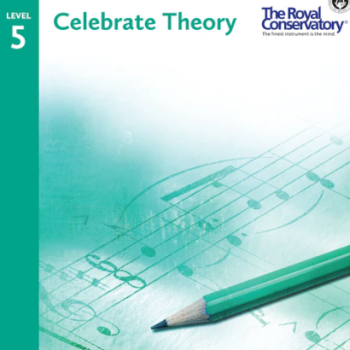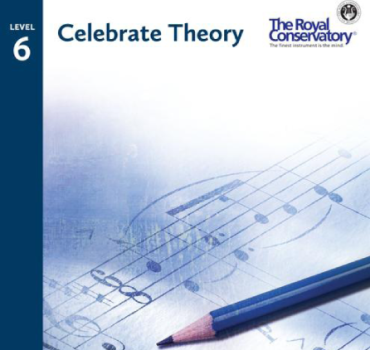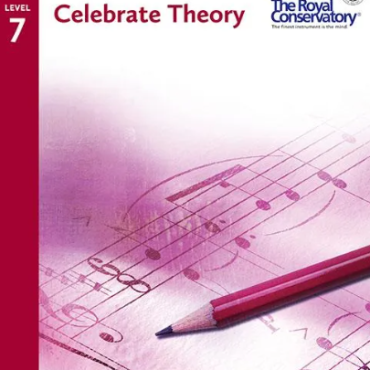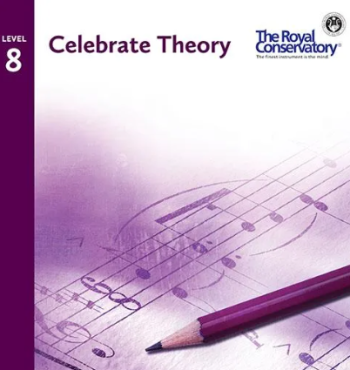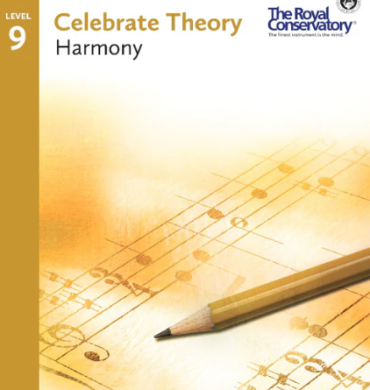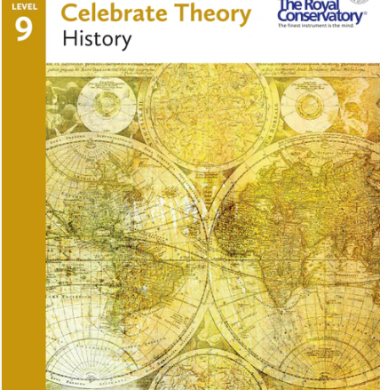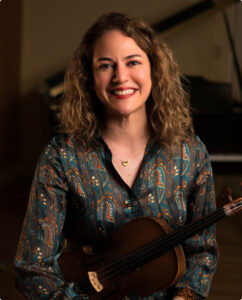Did you know that well-prepared students are 50-70% more likely to succeed in their exams? The RCM Theory Exam, a crucial part of music education through the Royal Conservatory of Music, is no exception.
Whether you’re studying music through a remote theory program or preparing for an online theory exam, having a solid plan is critical to success.
Levels 5-10 are crucial, laying the groundwork for advanced concepts like scales, intervals, rhythms, and chords.
This complete guide breaks down everything you need to know to master the RCM Theory Exam, offering practical tips, strategies, and a clear path to success.
Ready to dive in? Let’s get started!
What is the RCM Theory Exam?
The RCM Theory Exam is an essential component of music education that tests your understanding of fundamental music theory concepts.
Designed to ensure students have a well-rounded grasp of theory, this exam complements practical skills by evaluating key elements like scales, intervals, rhythms, and chords.
For those studying through an online exam or traditional in-person classes, the exam provides flexibility while maintaining the high standards of the Royal Conservatory of Music.
Successfully passing the exam is an achievement to celebrate as it demonstrates that you have the theoretical foundation required to advance to higher levels of musical proficiency.
RCM Theory Exam Level 5: Building a Strong Foundation
Level 5 of the RCM Theory Exam marks the beginning of more advanced music theory concepts. This test introduces students to essential units of music theory, including scales, key signatures, and intervals.
This level lays the groundwork for further study, helping you confidently move forward to the more complex theory elements introduced at higher levels.
Key Focus Areas:
- Major and minor scales (up to four sharps or flats)
- Simple intervals
- Key signatures and basic chords
RCM Theory Exam Level 6: Advancing Your Knowledge
Level 6 of the RCM Theory Exam takes students deeper into music theory, introducing more advanced units of study like harmony, chords, and complex intervals. This examination challenges students to expand on the fundamentals learned in previous levels, preparing them for the final exam at this stage.
Each lesson builds on previous knowledge throughout this level, reinforcing key concepts and helping you confidently move forward to the more intricate theory elements introduced at higher levels.
Key Focus Areas:
- Harmonic and melodic minor scales
- Triads, including principal, minor, diminished, and augmented
- Critical signatures with up to five sharps or flats
- More advanced intervals and their inversion
RCM Theory Exam Level 7: Expanding Theoretical Mastery
Level 7 of the RCM Theory Exam continues to build on your foundation by introducing more advanced topics in music theory. This level pushes students to refine their knowledge of chords, scales, and modulations.
The Royal Conservatory examination at this level is designed to provide students with a comprehensive understanding of more intricate theory concepts, laying the groundwork for higher-level examinations.
Level 7 aims to challenge your theoretical knowledge and provide a deeper understanding of how musical elements like harmony and intervals work together within compositions.
Key Focus Areas:
- Understanding modulation and fundamental changes
- Extended harmonic concepts, including seventh chords
- Harmonic and melodic minor scales with greater complexity
- Advanced critical signatures with up to six sharps or flats
RCM Theory Exam Level 8: Refining Advanced Theoretical Concepts
At Level 8 of the RCM Theory Exam, students delve into the most advanced aspects of music theory before entering the final levels.
This level encourages students to refine their analytical skills, allowing them to measure their understanding of harmonic progressions and intricate modulations. A vital component of this level is also understanding the pulse of a composition, as it relates to rhythm and meter, while mastering harmonic relationships.
Key Focus Areas:
- Modulation to distant keys and understanding key relationships
- Advanced harmonic structures, including diminished and augmented seventh chords
- Harmonic analysis of more complex compositions
- More detailed work on intervals and their inversions
RCM Theory Exam Level 9: Mastering Advanced Harmony, Structure, and History
Level 9 of the RCM Theory Exam introduces students to harmony fundamentals and harmonic language’s core building blocks.
This level lays the foundation for understanding two- and four-part writing, essential for students aiming to master more advanced music theory.
RCM Theory Exam Level 9: Harmony
Level 9 of the RCM Theory Exam introduces students to harmony fundamentals and harmonic language’s core building blocks.
This level lays the foundation for understanding two- and four-part writing, essential for students aiming to master more advanced music theory.
Key Focus Areas
- Fundamentals of harmonic language: Explore the essential elements of harmony, focusing on chord progressions and harmonic relationships.
- Introduction to two- and four-part writing: Learn how to write harmonized melodies and create melodic decoration and structural balance across multiple voices.
- Melody writing and melodic decoration: Develop skills in creating original melodies and adding expressive elements through melodic decoration.
- Harmonic and structural analysis: Gain experience analyzing the harmony and structure of compositions, including 18th-century dances and inventions.
RCM Theory Exam Level 9: History
At History Level 9, the RCM Theory Exam introduces students to music history, covering essential eras and composers who have shaped Western music.
This level offers an interactive approach to understanding the evolution of music from the Baroque period to the Modern era.
Key Focus Areas:
- The Baroque Era: Composers like Vivaldi, Bach, and Handel highlight this period’s expressive and elaborate style.
- The Classical Era: A focus on Haydn, Mozart, and Beethoven, emphasizing the clarity, balance, and structure that define Classical music.
- The Romantic Era: Explore the emotional intensity of Schubert, Chopin, Berlioz, and Bizet, whose works epitomize the Romantic spirit.
- The Modern Era: Study innovators like Debussy, Stravinsky, Bernstein, Louie, and Adams, whose music reflects the experimentation and diversity of the 20th century.
- The Materials of Music: Understanding the fundamental building blocks of music, including rhythm, melody, harmony, and form, as they have evolved through history.
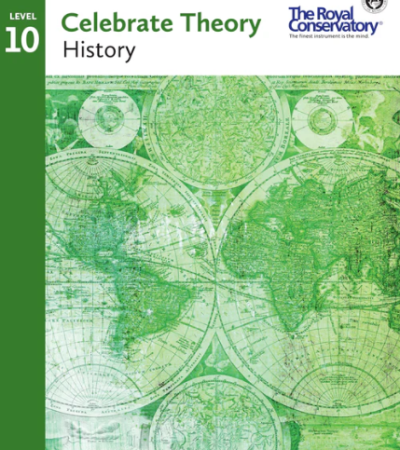
RCM Theory Exam Level 10: Exploring Music History in Depth
Level 10 of the RCM Level Exam comprehensively explores the key genres and styles that have shaped Western music from the Middle Ages to the Classical Era.
This level thoroughly studies necessary musical forms, instruments, and composers across the centuries.
Students will delve into the evolution of music history, enhancing their understanding of how historical contexts influenced compositional techniques and musical expression.
Key Focus Areas for Level 10 History:
- The Middle Ages: Study the origins of Western music, including forms like chant, organum, motet, and chanson, as well as instrumental dance music.
- The Renaissance Era: Explore genres such as the motet, mass, madrigal, and chanson and learn about the development of keyboard music during this era.
- The Baroque Era: Learn about the grandeur of opera, cantata, concerto grosso, and the orchestral suite, along with advancements in keyboard music.
- The Classical Era: This section will focus on the emergence of the symphony, oratorio, opera, piano concerto, sonata, and chamber music, exploring how these forms became foundational to Western classical music.
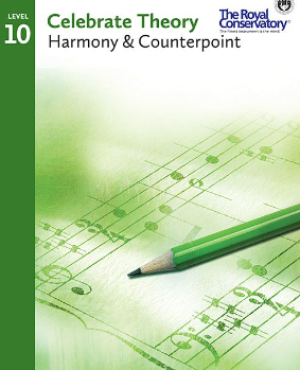
RCM Theory Exam Level 10: Harmony and Counterpoint
Level 10 of the RCM Theory Exam in Harmony and Counterpoint takes students to the highest level of theoretical understanding, integrating advanced concepts that build upon the foundational knowledge acquired in previous levels.
This level encourages students to grasp musical vocabulary, syntax, and structure better.
By engaging with these challenging concepts, students refine their ability to analyze, compose, and understand complex harmonic and contrapuntal relationships.
Key Focus Areas for Level 10 Harmony & Counterpoint:
- Leading-tone diminished 7th chord: Master using this essential chord in harmonic progressions, enhancing students’ ability to handle complex harmonic structures.
- Dominant 9th and 13th chords: Explore the richness and versatility of extended chords in both tonal and modal contexts.
- Sequences: Learn to identify and compose musical sequences essential for creating fluid and connected musical ideas.
- Melody writing (16-measure binary form): Develop the skill of composing balanced and coherent melodies, focusing on binary form.
- Sonata form, rondo form, and fugal exposition: Gain a deep understanding of large-scale forms, including sonata and rondo, and master the fugal exposition as a critical counterpoint element.
How the RCM Online Theory Exam Works
The RCM Online Theory Exam allows students to take their exams from the comfort of their own homes.
This remote option allows students to complete their exams digitally through their browser, making it more convenient while maintaining the same high standards as in-person examinations.
Whether you’re studying independently or through a music school, the online format provides flexibility for busy schedules.
For additional preparation, students can use guided analysis through study resources before the exam, which can help clarify complex theoretical concepts.
The Process:
- Registration: Students must register for the RCM Online Theory Exam through the official Royal Conservatory of Music website. Once registered, they receive all the necessary details about the exam.
- Exam Format: The exam is conducted entirely online and consists of multiple-choice questions, short-answer questions, and exercises to test your understanding of music theory concepts. Students need a reliable internet connection and a computer to access the exam portal.
- Key Dates: The RCM sets specific exam dates throughout the year. Check the exam calendar for registration deadlines and the dates of the digital exams. Be sure to register early to secure your preferred exam time.
Taking the Exam Remotely:
- Students will receive access to the exam portal on the scheduled date. The exam must be completed within a specific timeframe, and students should prepare beforehand to ensure they understand the platform’s layout.
- All submissions are monitored for integrity, and the RCM ensures a secure and fair examination process.
Exam Format:
- The exam consists of multiple-choice, short-answer, and written exercises that test your understanding of music theory concepts like scales, key signatures, intervals, and harmony.
- The time limit for each level varies, with higher levels generally allowing more time to complete the exam. Students are encouraged to familiarize themselves with the format and practice using similar question types beforehand to build confidence.

Preparing for the Online Theory Exam
Importance of Structured Preparation:
- A well-organized study plan is vital to mastering the material for each level. Break down the topics—such as scales, intervals, and chords—into manageable study units, ensuring you cover everything comprehensively.
- Our academy offers comprehensive RCM Theory Exam preparation programs, which include interactive lessons, practice tests, and personalized feedback. These programs are designed to help you master each level of the RCM theory curriculum.
- Use online theory study tools like practice tests, interactive lessons, and flashcards. These tools allow students to track progress regularly, measure their understanding, and focus on weaker areas.
- Set aside regular study sessions leading up to the exam, reviewing each central concept multiple times to retain the information better.
- Get access to digital learning products, including practice exams and RCM study materials, covering all the critical theory concepts.
How to Access and Register for the RCM Online Theory Exam:
- To register for the RCM Online Theory Exam, visit the official Royal Conservatory of Music website. From there, you can select your exam level and preferred date and complete the registration process.
- Once registered, you’ll receive an email with details on accessing the exam portal, exam instructions, and other essential information. Make sure to familiarize yourself with the platform beforehand to be comfortable on exam day.

Fundamental Concepts Covered in the RCM Theory Exam
Major and Minor Scales:
- Major scales create a bright sound, while minor scales (natural, harmonic, melodic) offer different tonal variations. Each major scale has a relative minor that shares its key signature.
Key Signatures:
- Key signatures indicate the sharps or flats in a piece, determining its tonality. Recognizing and writing critical signatures for major and minor scales is crucial for success in the exam.
Intervals
In the RCM Theory Exam, students must identify and understand intervals such as perfect, major, minor, diminished, and augmented. Recognizing and analyzing intervals is essential for understanding harmonic relationships and developing a deeper understanding of music theory.
Rhythm and Meter
Rhythm and meter are critical elements of musical structure. The exam will test your ability to read, notate rhythms, and understand time signatures.
- Rhythm: Practice recognizing note durations and rhythmic patterns.
- Meter: To interpret musical scores accurately, familiarize yourself with simple and compound meters and time signatures.
Chords and Harmony
Chords and harmony are foundational to creating musical structure. Students must be able to identify and build triads (major, minor, diminished, and augmented) and recognize harmonic progressions.
- Chords: Focus on constructing primary triads and seventh chords.
- Harmony: Understand how chords function together to support a melody.
Exam Tips for Intermediate Levels (5-10)
Tips for Level 5 Theory Exam
At Level 5, it’s essential to master the basics of scales, intervals, and harmony. This is the foundation of your progress through the RCM certificate program.
To ensure success, start learning at a comfortable pace and gradually build your understanding of critical concepts like major and minor scales and key signatures.
Consistent practice will help solidify these core areas as you prepare for more advanced topics at future levels.
Progressing Through Levels 6-10
As you move through Levels 6-10, building upon the knowledge from previous levels is essential. Each level in the RCM certificate program introduces more complex theory elements, such as advanced harmony, chord progressions, and modulations. Here are some key areas to focus on:
- Level 6: Expand your knowledge of minor scales and chord inversions while gaining a deeper understanding of key signatures with more sharps and flats.
- Level 7: Begin to explore more intricate harmonic progressions and how modulations affect tonal relationships.
- Levels 8-9: Tackle advanced topics such as chromatic harmony, extended chords, and formal analysis of more significant works.
- Level 10: Master complex modulations, augmented and diminished intervals, and advanced harmonic analysis.
Take each level at your own pace and reinforce your understanding with regular practice. Every step, from scales and key signatures to advanced harmony, is vital to your success in the RCM theory exams.

Preparing for the RCM Online Theory Exam
Creating a structured study schedule is vital to success in the online format.
Follow step-by-step procedures to break your preparation into manageable sections, focusing on scales, intervals, and harmony.
Use online theory study resources like practice exams, interactive lessons, and flashcards to reinforce learning and ensure a firm grasp of each concept.
For the remote exam, ensure you are technically prepared. Test your internet connection, familiarize yourself with the exam platform, and set up a quiet, distraction-free environment. Being comfortable with the format will help you stay focused and achieve the best possible final mark.
Key Dates and Deadlines for the RCM Theory Exams
- It is crucial to stay on top of essential exam dates and registration deadlines for success. The RCM offers digital exams throughout the year, with specific registration and exam completion windows.
- Regularly check the Royal Conservatory of Music website for the most up-to-date schedules.
- Set reminders for registration deadlines and exam dates based on your level to stay organized. Using digital calendars or apps to ensure you’re prepared well in advance can help reduce last-minute stress.
- Our academy also provides periodic notifications to remind students of important dates, ensuring you never miss a deadline.
- Visit our RCM Theory Exam page for more information on how to register and prepare for your exam.
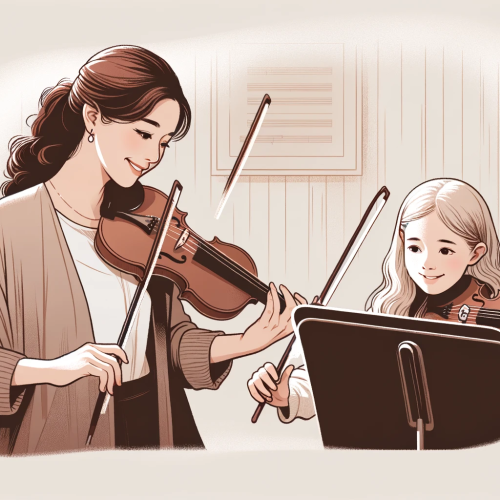
Wrapping Up
Mastering intermediate theory concepts such as scales, key signatures, intervals, and chords is essential for success in the RCM Theory Exam.
These foundational elements pave the way for advanced musical understanding and help students progress confidently through the exam levels.
Online theory study resources are a great way to reinforce learning and stay on track. With the proper preparation, structured study, and focus, you’ll be well-equipped to navigate the RCM theory exam process and achieve your goals.

FAQs
How does the RCM online theory exam work?
The RCM online theory exam allows students to take their tests remotely through a digital platform. After registering, students receive access to the exam portal on the designated exam date and complete the exam within a set time frame. The exam tests students’ knowledge of music theory without requiring them to use an instrument like a piano.
What are the critical theory levels for the exam?
The RCM Theory Exam covers levels 5 through 10, each building on the previous with increasingly complex topics such as scales, key signatures, intervals, harmony, and form analysis.
How do I prepare for the RCM theory test remotely?
To remotely prepare for the RCM theory test, create a structured study plan and use online resources such as practice tests, flashcards, audio examples, and interactive lessons. Ensure your technical setup (internet, device) is ready, and familiarize yourself with the exam platform beforehand.
